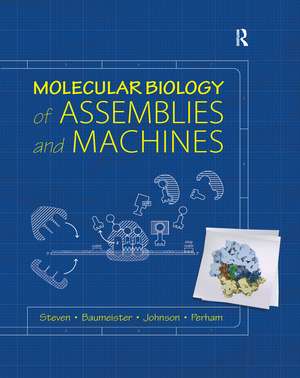Molecular Biology of Assemblies and Machines
Autor Alasdair Steven, Wolfgang Baumeister, Louise N. Johnson, Richard N. Perhamen Limba Engleză Paperback – 8 aug 2022
Essentially all major biological activities are performed by assemblies of macromolecules (proteins, RNA, and DNA) acting in concert. These assemblies are dynamic and many are endowed with machine-like properties. This unique book explores the molecular mechanisms employed at the critical level between individual macromolecules and cells and organelles.
Preț: 360.26 lei
Preț vechi: 380.78 lei
-5% Nou
Puncte Express: 540
Preț estimativ în valută:
68.94€ • 71.71$ • 56.92£
68.94€ • 71.71$ • 56.92£
Carte tipărită la comandă
Livrare economică 14-28 aprilie
Preluare comenzi: 021 569.72.76
Specificații
ISBN-13: 9781032340067
ISBN-10: 1032340061
Pagini: 880
Ilustrații: 819
Dimensiuni: 219 x 276 x 53 mm
Greutate: 2.74 kg
Ediția:1
Editura: CRC Press
Colecția Garland Science
Locul publicării:Boca Raton, United States
ISBN-10: 1032340061
Pagini: 880
Ilustrații: 819
Dimensiuni: 219 x 276 x 53 mm
Greutate: 2.74 kg
Ediția:1
Editura: CRC Press
Colecția Garland Science
Locul publicării:Boca Raton, United States
Cuprins
1. The Machines and Assemblies of Life
2. Chromatin
3. DNA Replication
4. DNA Repair and Recombination
5. Transcription
6. Protein Synthesis and Folding
7. Intracellular Proteolysis: Protein Quality Control and Regulatory Turnover
8. Assembly of Viruses
9. Multienzyme Complexes: Catalytic Nanomachines
10. Transport
11. Connectivity and Communication
12. Signaling
13. The cell cycle and cell death
14. Motility
15. Bioenergetics
16. Membrane Channels and Transporters
17. Complexes of the Immune System
2. Chromatin
3. DNA Replication
4. DNA Repair and Recombination
5. Transcription
6. Protein Synthesis and Folding
7. Intracellular Proteolysis: Protein Quality Control and Regulatory Turnover
8. Assembly of Viruses
9. Multienzyme Complexes: Catalytic Nanomachines
10. Transport
11. Connectivity and Communication
12. Signaling
13. The cell cycle and cell death
14. Motility
15. Bioenergetics
16. Membrane Channels and Transporters
17. Complexes of the Immune System
Notă biografică
Wolfgang Baumeister is Director and Head of the Department of Structural Biology at the Max Planck-Institute of Biochemistry in Martinsried, Germany. Baumeister studied biology, chemistry and physics at the Universities of M nster and Bonn and obtained his PhD from the University of D‘sseldorf. In 1973, he began his career as Research Associate in the Department of Biophysics at the University of D‘sseldorf and held a Heisenberg Fellowship spending time at the Cavendish Laboratory in Cambridge, England. In 1982 he became a Group Leader at the Max-Planck-Institute of Biochemistry in Martinsried, Germany and then appointed Director and Head of the Department of Structural Biology. Baumeister pioneered the development of cryo-electron tomography and his work has shaped the understanding of the structure and function of the cellular machinery of protein degradation. His awards include the Otto Warburg Medal, the Schleiden Medal, the Louis-Jeantet Prize for Medicine, the Stein and Moore Award, the Harvey Prize in Science and Technology and the Ernst Schering Prize. He is a member of several academies including the US National Academy of Sciences and the American Academy of Arts and Sciences.Louise N. Johnson was an Emeritus Fellow of the Corpus Christi College at the University of Oxford in Cambridge, UK. Johnson was educated at University College, London, and began her postgraduate career at the Royal Institution working with Lawrence Bragg and David Phillips. There she co-discovered the structure of lysozyme in 1965, then the second protein and first enzyme ever solved by X-ray crystallography. As the David Phillips Professor of Molecular Biophysics at Oxford from 1990 to 2007, Johnson led structural studies of regulatory proteins of the cell cycle, protein kinases, and glycogen metabolism, crucial to understanding the origin of disease and new drug design. In 1976, together with Tom Blundell, she coauthored the widely infl
Descriere
Molecular Biology of Assemblies and Machines provides a comprehensive narrative of the ways in which macromolecular structures assemble and how they interact with other complexes and organelles in the cell. Richly illustrated in full color, the text is written for advanced undergraduates, graduate students, and researchers in biochemist
